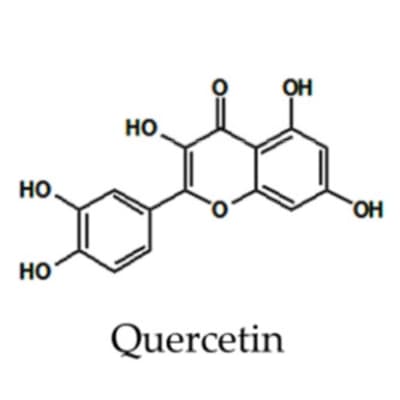
Quercetin is a plant flavonol from the flavonoid group of polyphenols. It is widely distributed among different fruits and vegetables.[1]
Dietary Sources
- Pomegranate
- Green tea
- Red onion
- Mango
- Moringa oleifera
- Blueberries
- Chicory
- Tomato
- Apple
- Passion Flower
- White mulberry
Safety[2]
Healing Properties
Anti-Carcinogenic (anticancer)
Antiproliferative
Quercetin has demonstrated antiproliferative activity against colon and breast cancer cells.[3]
- Treatment of quercetin had reduced the proliferation rates of colon HCT116 and breat MDA-MB-231 cancer cells.[3:1]
Cancer chemopreventive agent
Treatment with quercetin dihydrate has been shown to promote the killing activity of T cells on cancer cells.[4]
The growth rate of tumor volumes and masses treated with quercetin dihydrate were decreased.[4:1]
Anti-Inflammatory
Strong antiinflammatory activity.[1:1]
Anti-Infective
Antioxidant
Quercetin is one of the most potent antioxidants of plant origin.[1:2]
Quercetin has direct radical scavenging action.[1:3]
Brain Health
Neuroprotective
Several in-vitro studies have reported that quercetin demonstrates neuroprotection.[1:4]
Quercetin’s metabolites after absorption have all been shown to afford neuroprotection as well.[1:5]
Quercetin protects against progressive dopaminergic neurodegeneration.[1:6]
Neuroregeneration
Quesrcetin stimulates neuronal regeneration.[1:7]
Antioxidant
It has been shown to protect neurons from oxidative damage while reducing lipid peroxidation.[1:8]
Anti-Inflammatory / Anti-Amyloid Fibrils
In addition to its antioxidant properties, it inhibits the fibril formation of amyloid-β proteins, counteracting cell lyses and inflammatory cascade pathways.[1:9]
- Suppresses neuroinflammatory processes by downregulating pro-inflammatory cytokines.[1:10]
- Prevents the degradation of acetylcholine, and decreases Aβ production.[1:11]
Cognitive performance
Quercetin restores acetylcholine levels through the inhibition of hydrolysis of acetylcholine by AChE enzyme.[1:12]
Memory Enhancer
Quercetin and rutin have been reported to function as memory enhancers in scopolamine-induced memory impairment tests, thus possibly enhancing cholinergic neurotransmission.[1:13]
Psychostimulant
Heart Health / Cardiovascular Health
Antiinflammatory
Quercetin Attenuates Atherosclerotic Inflammation[5]
Anti-Atherogenic
Quercetin inhibits atherogenesis (hardening/narrowing of the arteries).[5:1]
Blood Health
Inhibits platelet aggregation.[1:14]
Metabolism
Energy Production / Mitochondrial Health
Quercetin protects against mitochondrial dysfunction.[1:15]
Quercetin stimulates mitochondrial biogenesis.[1:16]
- Quercetin ameliorates mitochondrial dysfunction by restoring mitochondrial membrane potential, decreases ROS production, and restores ATP synthesis.[1:17]
- It also increases the expression of AMP-activated protein kinase (AMPK), which is a key cell regulator of energy metabolism.[1:18]
Disease / Symptom Treatment
Cancer
Quercetin dihydrate has the exciting potential to be used as a cancer chemopreventive agent. Treatment with quercetin dihydrate has been shown to promote the killing activity of T cells on cancer cells.[4:2]
The growth rate of tumor volumes and masses treated with quercetin dihydrate were decreased.[4:3]
Neurodegenerative Diseases
Quercetin Disaggregates Prion Fibrils and Decreases Fibril-Induced Cytotoxicity and Oxidative Stress.[6]
Neuroinflammation
Reducing the neuroinflammatory events in microglia might afford a beneficial strategy for the prevention of the progression of inflammatory-mediated neurodegenerative disorders.[1:19]
Quercetin has been reported to have anti-inflammatory actions, and is a suitable candidate among phytochemicals for future studies on its efficacy to reverse neuroinflammation.[1:20]
Quercetin has been shown to inhibit neuroinflammation by reducing nitric oxide production, iNOS gene expression in microglia, the production of inflammatory cytokines, as well as a reduction in cytokine expression as reported from in vivo studies.[1:21]
Alzheimer’s Disease (AD)
- Reverses histopathological hallmarks of AD[1:22]
- Improves motor function[1:23]
- Reduces α-synuclein fibrillization[1:24]
- Reduces hippocampal neuronal cell death[1:25]
- Improves synaptic plasticity[1:26]
- Quercetin has shown therapeutic efficacy, improving learning, memory, and cognitive functions in AD.[1:27]
- Quercetin administration reverses extracellular β-amyloidosis and decreases tauopathies, astrogliosis, and microgliosis in the hippocampus and amygdale, thus protecting cognitive and emotional function in age triple transgenic Alzheimer’s disease model.[1:28]
Quercetin interferes with the formation of neurotoxic oligomeric Aβ species and displays fibril destabilizing effects on preformed fibrillar Aβ, reversing Aβ-induced neurotoxicity.[1:29]
Parkinson’s Disease
Dopaminergic Neurodegeneration
Quercetin protects against progressive dopaminergic neurodegeneration.[1:30]
Cognitive Impairment
Ischemia
Traumatic injury (brain/spinal)
Isoquercetin improved motor functions in acute spinal cord injury.[1:31]
Huntington’s disease
Synergistic Effects
Nicotinamide adenine dinucleotide (NAD+)
Cell Protection (Helps prevent DNA damage)
Quercetin can significantly potentiate the cell protection and rescue effects of Nicotinamide adenine dinucleotide (NAD+).[7]
Quercetin has been independently shown to significantly protect cells from DNA-damaging agents and induced cell death.[7:1]
The NAD+ precursors Nicotinic acid and Nicotinamide, when administered with Quercetin significantly improved cell protection and rescue effects, plausibly due to increased intracellular NAD+ levels.[7:2]
Title: Neuroprotective Effects of Quercetin in Alzheimer’s Disease
Publication: MDPI Biomolecules
Archive: archive, archive-mirror ↩︎ ↩︎ ↩︎ ↩︎ ↩︎ ↩︎ ↩︎ ↩︎ ↩︎ ↩︎ ↩︎ ↩︎ ↩︎ ↩︎ ↩︎ ↩︎ ↩︎ ↩︎ ↩︎ ↩︎ ↩︎ ↩︎ ↩︎ ↩︎ ↩︎ ↩︎ ↩︎ ↩︎ ↩︎ ↩︎ ↩︎ ↩︎Title: Safety Aspects of the Use of Quercetin as a Dietary Supplement
Publication: Wiley Online Library: Molecular Nutrition & Food Research
Archive ↩︎Title: Synthesis, Antiproliferative Activity and Radical Scavenging Ability of 5-O-Acyl Derivatives of Quercetin
Publication: MDPI - Molecules
Archive: archive, archive-mirror ↩︎ ↩︎Title: Quercetin inhibiting the PD-1/PD-L1 interaction for immune-enhancing cancer chemopreventive agent
Publication: Wiley Online Library: Phytotherapy Research
Archive ↩︎ ↩︎ ↩︎ ↩︎Title: Quercetin Attenuates Atherosclerotic Inflammation by Inhibiting Gal‐3‐NLRP3 Signaling Pathway
Publication: Wiley Online Library ↩︎ ↩︎Title: Quercetin Disaggregates Prion Fibrils and Decreases Fibril-Induced Cytotoxicity and Oxidative Stress
Publication: MDPI - Pharmaceutics
Archive: archive, archive-mirror ↩︎Title: Resveratrol and Quercetin Potentiate the Cell Protection and Rescue Effects of NAD+ Precursors in HEK293 Cells Challenged by DNA Damaging Agent, N-Methyl-N′-nitro-N-nitrosoguanidine
Publication: Sage Journals: Natural Product Communications
Date: September 24, 2021
Archive ↩︎ ↩︎ ↩︎